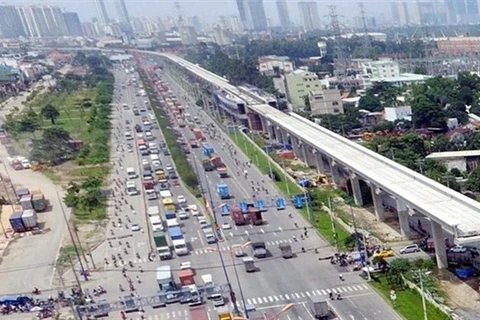Hanoi (VNA) – The Ministry of Natural Resources and Environment (MONRE) has built and submitted an overall scheme on the building of national land database for 30 cities and provinces to the Government.
In order to ensure the progress of the scheme, the MONRE submitted the scheme using the World Bank’s loans to the Government.
It was unveiled by a representative from the General Department of Land Administration during a working session in Hanoi on February 18 between the MONRE, the Ministry of Information and Communications (MIC) together with ministries and agencies related to land information system and database.
Scheme underway in 33 localities
Minister of Natural Resources and Environment Tran Hong Ha emphasised that building land database is one of the Government’s six important data projects, thus laying groundwork for e-Government building.
As Vietnam is conducting the fourth Industrial Revolution, it is significant to build the nationwide land database.
Reporting the outcomes of the effort, deputy head of the General Department of Land Administration Chu An Truong said the MONRE built land information system and database from 2014-2015.
Later on December 23, 2016, the State President approved a funding agreement for a project on strengthening land management and database that took effect in March 2017 with a total cost of 180 million USD, benefiting 33 cities and provinces. The project is underway from 2017-2021.
However, it is only carried out in 33 cities and provinces. Therefore, the MONRE submitted the scheme to benefit the remaining 30 localities.
A representative from the general department proposed that the MIC partner with the MONRE to build the scheme for 30 cities and provinces that are yet to receive investment in the Improved Land Governance and Database (VIGL) project, laying foundation for e-government building.
At the working session, representatives from ministries and agencies agreed with a need to build a land database for 30 cities and provinces. However, they also called for ensuring its safety and linkage with ministries and agencies.
Of the same view, Minister of Information and Communications and Vice Chairman of the National Committee on E-Government Nguyen Manh Hung said building land database is one of the Government’s six important data projects, laying groundwork for e-Government building. However, two out of six databases, including land and residential areas, have yet to be completed.
Therefore, the building of a project for 30 localities that are yet to benefit from VIGL project is extremely important.
A common model needs to be built
Minister Nguyen Manh Hung noted that in accordance with the 2013 Land Law, the central land database is managed by the MONRE while the local land database is under the management of localities. Therefore, it is necessary to build a common model to prevent the case of "hundreds of flowers blooming".
He said the Decree No.85/2016/ND-CP regulates specific responsibilities for ensuring the safety of information system. Heads of agencies and organisations are responsible for the work in their operations.
“In case there are not any units in charge of independent information safety, heads of agencies and organisations must take responsibility for assigning information technology units to guarantee information safety, establishing or appointing units specialised in information safety under the management of IT units,” Hung said.
Minister Hung noted that the province will create apps for the public to search data (with fee collection and exemption). However, the MONRE should issue a circular guiding the building of apps.
Sharing the same view, Minister Tran Hong Ha required the general department, especially the management board of a project on strengthening land management and land database, to complete papers for the work in 30 cities and provinces.
Additionally, specialised units should suggest measures to unfinished work in the project.
Such will lay basic foundation for land governance based on nationwide land information system in order to improve the efficiency of State administrative apparatus, the quality of services to the public and businesses, develop e-Government towards a digital Government, economy and society./.

























